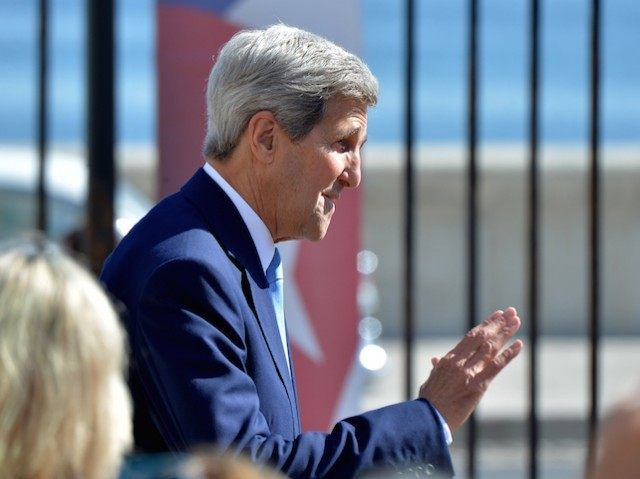Secretary of State John Kerry will not travel to Cuba ahead of President Barack Obama’s trip to the island on March 21, according to State Department officials. Various reports cite logistical issues at the nascent American embassy in Havana and human rights disputes between the two governments as the reasons.
“I may be down there in the next week or two to have a human rights dialogue, specifically,” Kerry told reporters in February, following the announcement of President Obama’s visit. He never specified a date for such a visit, and officials are now saying it will not happen.
Reuters cites “two U.S. officials” as stating the cancelation was due to “U.S. and Cuban officials [being] deep in negotiations on issues including which dissidents Obama might see in Havana.” In that context, Reuters reports, Kerry’s presence was “not seen as constructive.”
Miami’s El Nuevo Herald also cites anonymous officials but gives two reasons the trip will not transpire: “logistical problems from trying to organize two high-level trips in such a short time” and the inability for Cuban and American officials to agree on whether Kerry could meet with certain anti-communist dissidents.
The Herald notes the reports of this cancelation follow public remarks by United States Deputy Secretary of State Antony Blinken condemning the widespread political arrests of dissidents on a weekly basis in Geneva, Switzerland.
The Los Angeles Times, which first reported the news, tells a similar story. It cites two camps of State Department officials, some who doubted the ability of the “bare-bones operation” at the American embassy to organize the trip and others who cited Kerry’s dashed hopes to meet with dissidents.
The Times adds that White House officials are still working to convince the communist dictatorship to allow President Obama to meet with certain dissidents the government considers off-limits. “When U.S. diplomats began negotiations for Obama’s visit, they said any attempt to block him from meeting dissidents would be a deal breaker,” one official told the newspaper.
Not only does the Cuban government appear unwilling to allow such meetings, it has become increasingly restrictive of dissidents to whom it seemingly allowed greater freedom as a gesture towards the American government. Specifically, Havana has begun to imprison dissidents who had been released in what was seen as a “good will gesture” on the part of the communist government shortly before the White House announced major concessions to the Castro regime in December 2014.
In perhaps the most dramatic example of this, the Cuban government re-arrested prisoner of conscience Vladimir Morera Bacallao after releasing him. Bacallao had broken the law by placing an anti-Castro sign on his window and received a four-year sentence. In response, Bacallao began a hunger strike. He lasted slightly more than 80 days without eating, his relatives say, before the Cuban government began force-feeding him to prevent the publicity disaster that would have been the death of a dissident amid “normalization.” Those close to him describe him as “incoherent” and accused the government of drugging Bacallao to force him to eat.
The forced feeding of political dissidents conducting a hunger strike is a gross violation of international human rights law. The New York Times’ Joe Nocera has written:
Force-feeding has been labeled a violation on the ban of cruel, inhuman and degrading punishment. The World Medical Association holds that it is unethical for a doctor to participate in force-feeding. Put simply, force-feeding violates international law.
“It is hard to speak of progress when they make these rearrests,” a senior State Department official told Reuters in response to Kerry’s canceled visit. State Department spokesman John Kirby said in a statement that Kerry remains “interested in visiting in the near future,” adding, “We are working with our Cuban counterparts and our embassy to determine the best timeframe.” He did not provide further details.
President Obama remains scheduled to visit Cuba on March 21-22, after which he will travel south to Argentina. He is scheduled to meet with dictator Raúl Castro, though the topics on deck remain to be determined. In Argentina, President Obama is expected to discuss human rights with President Mauricio Macri, a popular conservative who has reversed his predecessor’s policies of cutting deals with the repressive Iranian government, potentially including the protection of Hezbollah-linked terrorists.
The Cuban state-run Granma newspaper has published a column absolving the Cuban government of any human rights abuses precisely because President Obama is willing to visit the island. An article titled “Four Myths Obama’s Trip to Cuba Disproves” lists “Cuba violates human rights” as a falsehood, despite daily reports of physical and psychological abuse against dissidents.
President Obama will not visit American troops stationed at the Guantánamo Bay military facility.

COMMENTS
Please let us know if you're having issues with commenting.